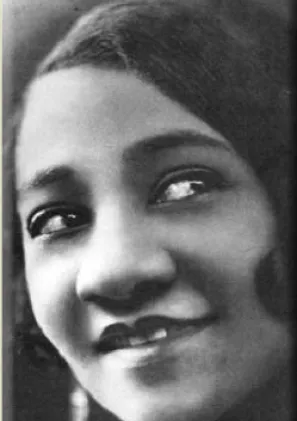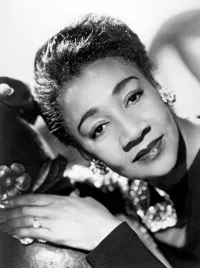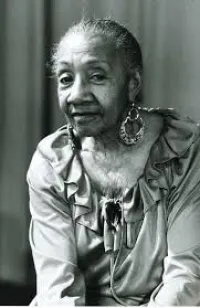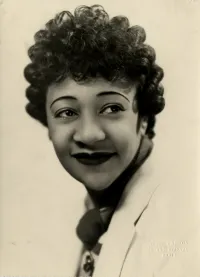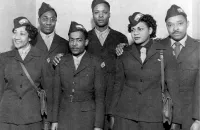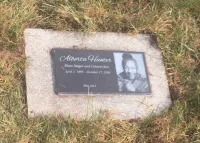Biography
1895 - 1984
“Maybe if I knew music I couldn't do what I am doing.”
– Alberta Hunter
At 12 she fled poverty in Memphis to become a blues singer in Chicago. Hunter began singing at a brothel, but nightclub jobs soon followed. When she had saved enough money, she moved her mother north and cared for her the rest of her life. Though married briefly, Hunter never consummated the union, saying she could not sleep with a man with her mother so close. In truth, she was a lesbian, and her real love was Lottie Taylor, her partner of many years. Though she had great success at Chicago venues like the famed Deluxe Café and Dreamland Café, in 1921 Hunter headed to New York to begin a recording career with the Black Swan label. She wrote much of her own material, including the famous ‘Down Hearted Blues’ and became the first African-American singer to be backed by a white band. By 1925 she was starring in musical reviews, two years later she left for Europe. She appeared as “Queenie” in the London production of ‘Show Boat’ and replaced Josephine Baker at the Casino de Paris. In 1944 she began touring with the USO, entertaining the troops. Devastated by her mother’s death, Hunter gave up singing. In 1954 she lied about her age in order to get into a Practical Nursing Program, saying she was 50 when actually 62. She worked as an LPN in New York City for 20 years until mandatory retirement ended her career at 70 (she was actually 82). In 1977 Alberta Hunter reemerged, performing at the Greenwich Village club The Cookery. In trademark shawls and dangling earrings, she became a sensation. She secured a Columbia recording contract, sang at The White House, and continued performing until her death in 1984.
1895 - 1984
“Maybe if I knew music I couldn't do what I am doing.”
– Alberta Hunter
At 12 she fled poverty in Memphis to become a blues singer in Chicago. Hunter began singing at a brothel, but nightclub jobs soon followed. When she had saved enough money, she moved her mother north and cared for her the rest of her life. Though married briefly, Hunter never consummated the union, saying she could not sleep with a man with her mother so close. In truth, she was a lesbian, and her real love was Lottie Taylor, her partner of many years. Though she had great success at Chicago venues like the famed Deluxe Café and Dreamland Café, in 1921 Hunter headed to New York to begin a recording career with the Black Swan label. She wrote much of her own material, including the famous ‘Down Hearted Blues’ and became the first African-American singer to be backed by a white band. By 1925 she was starring in musical reviews, two years later she left for Europe. She appeared as “Queenie” in the London production of ‘Show Boat’ and replaced Josephine Baker at the Casino de Paris. In 1944 she began touring with the USO, entertaining the troops. Devastated by her mother’s death, Hunter gave up singing. In 1954 she lied about her age in order to get into a Practical Nursing Program, saying she was 50 when actually 62. She worked as an LPN in New York City for 20 years until mandatory retirement ended her career at 70 (she was actually 82). In 1977 Alberta Hunter reemerged, performing at the Greenwich Village club The Cookery. In trademark shawls and dangling earrings, she became a sensation. She secured a Columbia recording contract, sang at The White House, and continued performing until her death in 1984.
Demography
Demography
Gender Female
Sexual Orientation Lesbian
Gender Identity Cisgender
Ethnicity African American Black
Nations Affiliated United States
Era/Epoch Harlem Renaissance (1919-1929) Roaring Twenties (1920-1929) World War II (1939-1945)
Field(s) of Contribution
Medicine
Military
Music
Theater
Commemorations & Honors
Asiatic Pacific Campaign Ribbon for Outstanding Service
City of Memphis Award for Immense Contributions to the Blues
Handy Award as Traditional Female Artist of the Year
NAACP Image Award Hall of Fame Awardee (1984)
Hunter's Comeback Album Amtrak Blues Honored by Blues Hall of Fame (2009)
Posthumous Blues Hall of Fame Induction (2011)
Posthumous Memphis Music Hall of Fame Induction (2015)
Demography
Gender Female
Sexual Orientation Lesbian
Gender Identity Cisgender
Ethnicity African American Black
Nations Affiliated United States
Era/Epoch Harlem Renaissance (1919-1929) Roaring Twenties (1920-1929) World War II (1939-1945)
Field(s) of Contribution
Medicine
Military
Music
Theater
Commemorations & Honors
Asiatic Pacific Campaign Ribbon for Outstanding Service
City of Memphis Award for Immense Contributions to the Blues
Handy Award as Traditional Female Artist of the Year
NAACP Image Award Hall of Fame Awardee (1984)
Hunter's Comeback Album Amtrak Blues Honored by Blues Hall of Fame (2009)
Posthumous Blues Hall of Fame Induction (2011)
Posthumous Memphis Music Hall of Fame Induction (2015)
Resources
Resources
Harrison, Daphne Duval. Black Pearls: Blues Queens of the 1920s. New Brunswick, N. J.: Rutgers University Press, 1988.
Taylor, Frank C., with Gerald Cook. Alberta Hunter: A Celebration in Blues. New York: McGraw-Hill, 1987.
https://en.wikipedia.org/wiki/Alberta_Hunter
https://memphismusichalloffame.com/inductee/albertahunter/
https://newyorktheater.me/2020/01/20/leaving-the-blues-review-the-gay-life-of-alberta-hunter/
Resources
Harrison, Daphne Duval. Black Pearls: Blues Queens of the 1920s. New Brunswick, N. J.: Rutgers University Press, 1988.
Taylor, Frank C., with Gerald Cook. Alberta Hunter: A Celebration in Blues. New York: McGraw-Hill, 1987.
https://en.wikipedia.org/wiki/Alberta_Hunter
https://memphismusichalloffame.com/inductee/albertahunter/
https://newyorktheater.me/2020/01/20/leaving-the-blues-review-the-gay-life-of-alberta-hunter/
